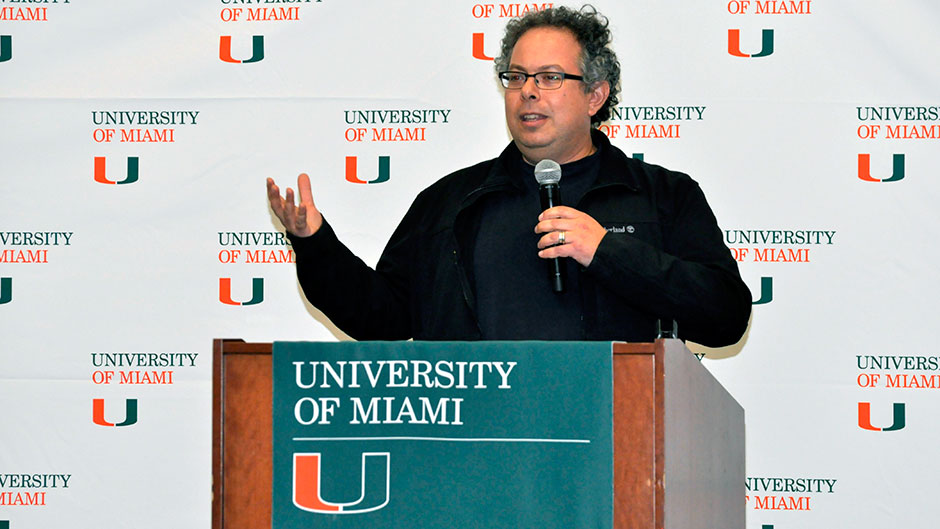Being a successful entrepreneur, said Rony Abovitz, is like jumping off a high cliff with a bag of parts and building the airplane that will save you on the way down.
“You have to be bold,” the University of Miami graduate and multi-millionaire entrepreneur told a rapt audience of engineering students, professors, and others Monday night at UM’s Newman Alumni Center. “Bold means you can’t be timid. If you’re going to do something, you just got to do it. You’ve got to be unafraid. If you’re not bold, don’t do it.
“But if you are bold, make sure you’re not looking and make sure you build the plane before you hit the ground,” said Abovitz, B.S.M.E. ’94, M.S.B.M.E. ’96, the featured speaker at the College of Engineering’s 2015 M. Lewis Temares Entrepreneurship Forum.
The founder of a $1 billion-dollar medical technology company whose latest venture has the half-billion-dollar backing of Google, Abovitz is at the forefront of what many believe will be the next major breakthrough in computing science: augmented reality.
Simply put, the still-secret technology promises to seamlessly blend computer graphics with the real world. A user wearing glasses or a headset would see overlays of pictures, graphics, and even other users “augmenting” their normal field of vision. Using such technology, a surgeon on the other side of the world could participate in a heart operation, a gamer could move among realistic moats and castles, or a scientist might one day walk on Mars from the comfort of his laboratory.
But the real revolution will be how the promise of computer technology finally merges with the potential of the human body. The greatest computer every designed, he told the audience, is the human brain we all carry inside our skulls.
“Computing is all about the human body going forward,” said Abovitz, whose Dania Beach-based startup, Magic Leap, received $542 million from Google and other Silicon Valley investors last year. “The next five years is going to be very big, and I think what you’re going to see is the whole importance of the human body in computing.”
What Abovitz stressed again and again to the students is that his life—and the life of any successful entrepreneur—is a series of magic leaps. Some may have nothing to do with the actual venture you’re contemplating, but all are crucial to the character needed to take an idea from a notebook to the NASDAQ.
As a self-described scrawny nerd undergraduate at UM in the early 1990s, Abovitz became obsessed with joining the university track team. He was repeatedly rejected but spent a year throwing a javelin on his own before a coach finally granted him a stomach-churning tryout that ended with him on the team.
His first company, MAKO Surgical Corp., got its funding on September 10, 2001, only to see it nearly disappear when hijacked planes brought down the World Trade Center the next day. He spent the year driving across the country personally demonstrating his concept, a robotic surgical arm, to investors, hospitals, and physicians.
“That was an important moment for an entrepreneur—would you and your idea keep going in a moment of great tragedy?” he told the students, referring to 9/11. “And would people continue to follow you and your idea despite the tragedy?”
The company, which he sold in 2013 for $1.65 billion, is a pioneer in devices like orthopedic implants used by surgeons for use in partial knee and total hip arthroplasty.
Abovitz talked of the incredible sensation of seeing something that he made being used by patients, bumping into complete strangers who were benefiting from his medical technology.
“If you take care of your work as an engineer, it’s going to reverberate through life and through the world in ways you never expected,” he said. “But don’t think you can just throw something out there that pollutes people and it ruins something and it doesn’t come back. When you do the right thing it comes back in a good way.”
Students who questioned Abovitz said they were mesmerized not only by his story but also by the way he told it, which included generous references to everything from Zen Buddhism to the movies Star Wars and The Lord of the Rings.
“He made some excellent points—thing I’ve never really thought about. He made me think that actually entrepreneurship may be a feasible idea for me,” said Anna Zapala, a sophomore in biomedical engineering slated to graduate in 2017.
“I’ve listened to a lot of talks like this, but his was excellent—he really covered a lot of bases about entrepreneurship, what it takes to succeed at this,” said Hunter Bihn, ’17, a double major in international business and economics, who suffers from diabetes and has developed his own startup that makes disposal of diabetic testing materials safe and effortless. “His venture was much more complex and much harder to get approved than hopefully mine is going to be, but it’s tremendously inspiring to see that he got through it in a much tougher setting. It was great.”

